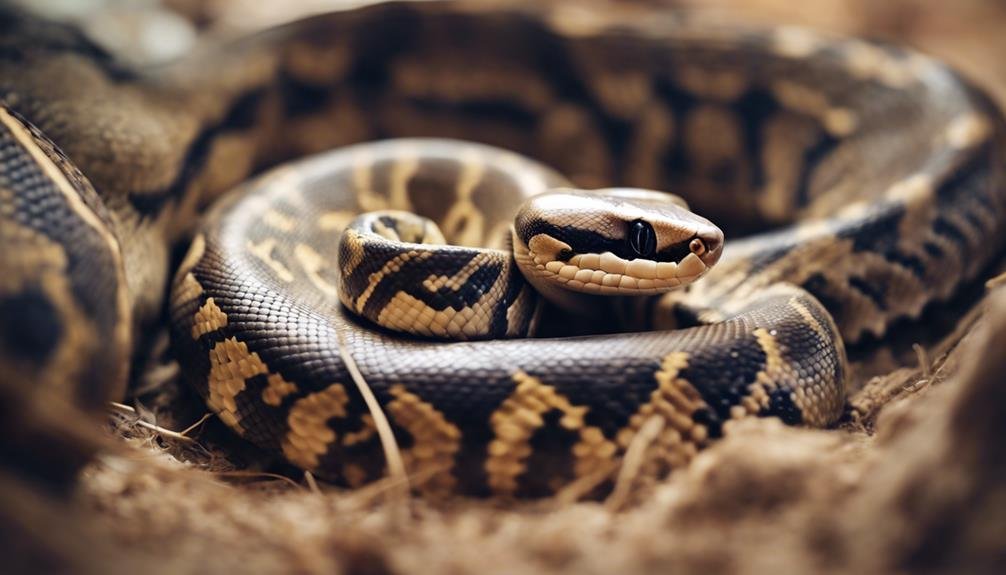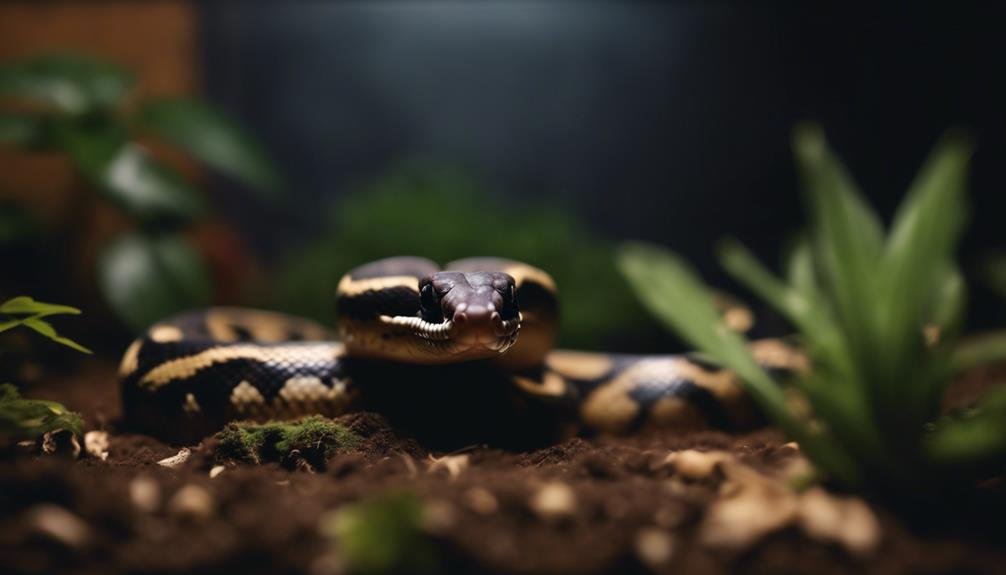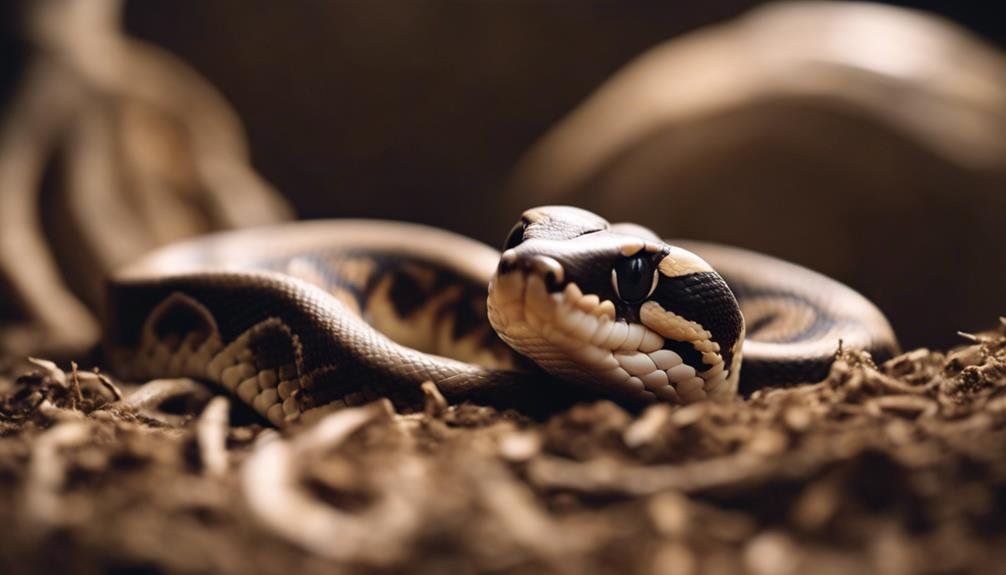You've probably noticed your ball python burrowing and wondered if it's just their nature or a sign of something more concerning. While it's true that burrowing can be a normal part of their behavior, excessive digging might signal stress, illness, or discomfort in their environment. Understanding the fine line between natural behavior and a cry for help is essential in ensuring your scaly friend stays healthy and content. But how can you tell the difference, and what steps should you take if you suspect their burrowing isn't just for fun? Let's explore the reasons behind this behavior and what it means for your ball python's well-being.
Key Takeaways
- Ball pythons burrow primarily for security, comfort, and to regulate their body temperature.
- Excessive burrowing can be a sign of stress, illness, or environmental dissatisfaction.
- A well-structured habitat with appropriate hides and temperatures is crucial for their well-being.
- Sudden changes in burrowing behavior warrant closer inspection for potential health or environmental issues.
- Consulting a reptile-experienced veterinarian is recommended for persistent unusual burrowing behavior.
Why Ball Pythons Hide
Ball pythons often hide to find security and comfort within their enclosures, especially when stressed, ill, or feeling threatened. This behavior isn't just a quirk; it's a critical aspect of their well-being. When you notice your snake seeking refuge more often than usual, it could be a sign to inspect their living conditions closely. Make sure their environment is well-structured, with proper hides and temperature settings to prevent unnecessary stress.
Inadequate enclosure setups can exacerbate hiding behavior. It's crucial to provide a habitat that mimics their natural environment, which includes access to hides where they can retreat and feel secure. Low humidity levels, for instance, can be particularly troublesome, affecting their shedding process and overall comfort. If the humidity isn't at a suitable level, your ball python may hide more frequently, attempting to find a microclimate within their enclosure that better suits their needs.
Normal Hiding Vs. Concerning Signs
While it's important for your ball python to seek hidden refuges, frequent or prolonged burrowing can signal underlying issues that need your attention. Ball pythons may burrow for security, comfort, or to regulate their body temperature. However, if you notice your snake burrowing more than usual or showing reluctance to come out, it's time to take a closer look.
Excessive burrowing could indicate stress, illness, or discontent with their environment. It's vital to monitor these patterns to identify potential health issues or environmental concerns. One key factor to watch is when ball pythons shed; they may seek more privacy, but this behavior should be temporary. Ensuring your pet has a comfortable enclosure with suitable hides, ideal temperatures, and proper humidity levels can greatly reduce unnecessary burrowing.
Understanding why your ball python burrows is important to improving their well-being. If your snake continues to exhibit unusual burrowing behavior despite a suitable environment, it may be a sign of illness or stress. In such cases, consulting a veterinarian experienced with reptiles is advisable to address any health concerns promptly. Remember, your ball python's behavior can provide valuable insights into their health and happiness.
Reasons for Burrowing Behavior


You've seen how ball pythons might burrow for various reasons, from seeking comfort to reacting against stress.
Now, let's focus on how these behaviors aren't just habits; they're clues. Understanding their natural instincts and what these actions indicate about their health is vital for any caretaker.
Natural Instincts
Understanding the natural instincts behind a ball python's burrowing behavior can offer valuable insights into their needs for security and comfort. In their natural environment, these reptiles instinctually seek out burrows to find shelter and security, a behavior they mimic in captivity.
It's not just about hiding; burrowing can also be a way for ball pythons to regulate their body temperature and maintain comfort. By providing suitable hides and enriching their environment, you're catering to these natural instincts, ensuring they feel protected and at ease.
Monitoring their burrowing habits can tell you a lot about their wellbeing, helping you understand when they're seeking comfort or trying to adjust to the temperature. It's a clear window into the complex behaviors driven by their natural instincts.
Health Indicators
Recognizing the reasons behind a ball python's burrowing behavior is key in identifying potential health issues or stress indicators. When you notice your ball python burrowing more than usual, it may not just be exploring or relaxing. It's important to think about:
- Illness or Stress: Burrowing can be a ball python's way of seeking comfort or protection when feeling sick or stressed. This behavior warrants closer observation and perhaps a vet visit.
- Boredom: A lack of environmental enrichment can lead to boredom and stress, prompting your ball python to burrow excessively.
- Prevention: Introducing climbing branches and other forms of environmental enrichment can greatly reduce stress levels and minimize unnecessary burrowing behavior.
Monitoring your ball python's behavior closely helps in the early detection of any health issues or signs of distress.
Assessing Enclosure Conditions
To guarantee your ball python thrives, it's important to closely monitor and adjust the enclosure's temperature, humidity, and layout. Keeping the warm end between 90-95°F and the cool side at 70-80°F is vital. This temperature gradient prevents your snake from burrowing excessively, which could indicate they're either too hot or too cold. If you notice your ball python burrowing frequently, it might be time to reassess the heat sources in their enclosure. A heat lamp, for instance, could be making the surface too hot, driving them to burrow to escape the heat. Conversely, if you're heating from below, they might be burrowing to get closer to the warmth.
Maintaining humidity levels within the 50-60% range is also important. If the enclosure's air is too dry, your ball python may burrow in an attempt to find a more humid microclimate, which could stress them out. Additionally, make sure there are adequately sized hides with entry and exit holes in the enclosure. These provide a sense of security and can reduce the need for burrowing. Regular monitoring for signs of stress or illness is important, as burrowing can sometimes indicate underlying issues.
Impact of Stress and Illness


Did you know that stress and illness can lead your ball python to burrow more frequently as a way to protect itself? This instinctual behavior isn't just a quirky trait; it's a potential red flag regarding your snake's health. When ball pythons feel threatened or unwell, they often retreat to the safety of burrows, mimicking their natural habitat's defensive mechanisms. This burrowing behavior serves as a critical indicator that something mightn't be right in their world.
Understanding the link between burrowing and health issues involves recognizing several key points:
- Increased Burrowing as a Stress Response: Sudden changes in burrowing habits can signal that your snake is experiencing stress or discomfort. This could be due to environmental factors, handling, or even the presence of other pets.
- Illness-Related Burrowing: Persistent burrowing, especially when accompanied by other symptoms (e.g., lethargy, refusal to eat), suggests your ball python could be unwell.
- Insights into Well-being: Regularly monitoring your snake's burrowing patterns offers valuable insights into its overall health and happiness. Significant deviations from their normal behavior warrant further investigation, possibly with the help of a veterinarian.
Addressing stressors and ensuring a healthy, enriching environment can mitigate excessive burrowing behavior, enhancing your snake's quality of life.
Can Ball Pythons Burrow when Feeling Scared or Sick?
When it comes to ball python safety tips, it’s important to consider their natural behavior. Ball pythons may burrow when feeling scared or sick. This can be a sign that they need space or a secure hiding spot. Providing a safe and comfortable environment is crucial for their well-being.
Strategies to Reduce Hiding
Understanding the link between stress, illness, and increased hiding, it's important to explore effective strategies to reduce this behavior in ball pythons. One key approach involves providing multiple hides across the enclosure. This doesn't just give your snake choices but also reduces the urge to excessively hide, as they feel more secure with options available. It's essential to implement a consistent handling routine as well. Regular, gentle interactions can build trust, making your ball python less inclined to hide whenever you're near. This routine should be predictable to avoid added stress.
Ensuring your snake's home has proper temperature gradients is another crucial strategy. Ball pythons are more likely to be active and explore their environment when they can comfortably regulate their body temperature. An enclosure that's too cold or too hot can drive them to hide more frequently.
Lastly, adding variety to their habitat with climbing structures and various hiding spots can keep boredom at bay and decrease the tendency to hide. It's about creating an enriching environment that caters to their natural behaviors. By closely monitoring their preferences and adjusting the setup accordingly, you'll create a secure habitat that minimizes the need for constant hiding.
Seeking Veterinary Assistance


When you notice your ball python exhibiting signs of illness or distress, such as excessive burrowing, it's important to seek veterinary assistance promptly. This burrowing behavior could be an indication that your pet isn't merely hiding but may be experiencing discomfort or pain requiring professional attention.
Seeking the help of a qualified reptile veterinarian isn't just about getting treatment; it's about promoting the overall health and happiness of your ball python. Here are three important reasons why:
- Accurate Diagnosis: A reptile specialist can conduct a thorough examination to identify the root cause of your ball python's unusual burrowing behavior. Whether it's due to sickness or stress, an accurate diagnosis is the first step towards recovery.
- Effective Treatment: Veterinary assistance ensures that any medical conditions affecting your ball python's well-being are properly addressed. With the right treatment plan, your pet can return to its normal, healthy self sooner than later.
- Valuable Advice: Consulting with a veterinarian experienced in treating reptiles provides insights and recommendations tailored to your ball python's specific needs. This expert guidance can help prevent future health issues and promote a thriving environment for your pet.
Don't underestimate the importance of veterinary assistance when it comes to your ball python's health. Addressing issues early can make a significant difference in your pet's quality of life.
Conclusion
You've learned that while it's natural for ball pythons to burrow for comfort and security, excessive hiding could signal stress, illness, or discomfort. Ensuring their habitat is up to par, with proper hides, temperature, and humidity, is key.
If your snake's burrowing habits seem off, it might be time to address potential stressors or health issues. Don't hesitate to seek a vet's advice if unusual behavior continues.
Keeping your slithery friend happy and healthy means being attentive to their unique needs.


